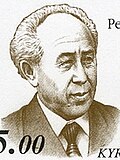Candidates
Three candidates appeared on the ballot. Askar Akayev, the incumbent, was widely favored to win. His campaign emphasized job creation and infrastructure modernization. He was most popular in the north, where he is from, and among the Russian minority. His main opponent was Absamat Masaliyev, the former leader of communist Kyrgyzstan. He opposed Akayev's reforms, especially land privatization, and advocated a return to a more Soviet-style economy. His base of support was in the south, but his platform was widely unpopular among the Kyrgyz people. The third candidate was Medetkan Sherimkulov, who supported a more moderate left-wing program, including free healthcare and education. However, his support of removing Russian as a state language alienated him from the Russian-speaking minority. [3]
This page is based on this
Wikipedia article Text is available under the
CC BY-SA 4.0 license; additional terms may apply.
Images, videos and audio are available under their respective licenses.



